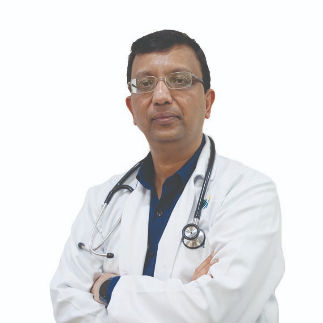How to Reduce Visceral Fat: A Simple Guide to Better Health
Learn how to reduce visceral fat and improve your health with effective diet, exercise, and lifestyle changes. Discover key strategies to lower hidden belly fat.

Written by Dr. Sonia Bhatt
Last updated on 3rd Jul, 2025

Introduction
Visceral fat is the fat that you can't see, but it’s found deep inside your body, surrounding your organs such as the liver, pancreas, and intestines. Although it doesn't show up as a bulge on your skin, it can cause serious health problems.
What is Visceral Fat?
Visceral fat is different from the fat you can pinch under your skin, known as subcutaneous fat. It’s stored deep in the abdomen, around important organs like the heart, liver, and intestines. While you can't see visceral fat, it is much more dangerous to your health than subcutaneous fat. It affects your organs, releasing harmful substances that can lead to serious health issues over time.
Health Risks Linked to Visceral Fat
Having too much visceral fat can cause several health problems. It is linked to conditions such as heart disease, diabetes, and metabolic syndrome, which are a group of risk factors that increase your chances of developing these diseases. Here are some of the health risks associated with too much visceral fat:
Heart Disease: Visceral fat can raise your cholesterol and blood pressure, putting you at higher risk of heart attacks and strokes.
Type 2 Diabetes: Excess fat can make your body less sensitive to insulin, which can lead to high blood sugar levels and eventually type 2 diabetes.
Metabolic Syndrome: This is a group of conditions, including high blood sugar, high cholesterol, and obesity, that increase your risk of heart disease and diabetes.
Why Does Visceral Fat Build Up?
Several factors contribute to the build-up of visceral fat in your body. Some are within your control, while others are related to your genetics or hormones.
Lack of Physical Activity: Living a sedentary lifestyle, or sitting for long periods of time, is one of the biggest contributors to visceral fat. When you don’t move much, your body tends to store more fat, especially in the abdomen. It’s important to get active every day, even if it’s just for a short walk.
Poor Diet Choices: A diet high in processed foods, sugary drinks, and unhealthy fats can lead to fat build-up. Sugary foods and drinks cause a spike in blood sugar levels, which encourages your body to store fat. Likewise, a diet high in unhealthy fats (like those in fast food, fried food, and sweets) can lead to weight gain and increased visceral fat.
Genetics and Hormones: Your genes and hormones play a role in where fat is stored in your body. Some people may naturally store more fat in the abdominal area. Additionally, hormonal changes, especially during menopause, can lead to an increase in visceral fat.
Consult Top Experts for Personalised Solutions
The Health Problems Caused by Visceral Fat
Excess visceral fat doesn’t just make your waistline bigger; it also harms your internal organs and puts you at risk of serious health issues.
Metabolic Syndrome: Visceral fat can lead to metabolic syndrome, which increases the risk of heart disease, stroke, and type 2 diabetes. This syndrome is made up of several health problems, including high blood pressure, high blood sugar, and high cholesterol levels, all of which can be worsened by excess fat around your internal organs.
Cardiovascular Disease: Having too much visceral fat can raise your blood pressure and cholesterol, which increases the chances of developing heart disease or having a stroke. This is because the fat around your organs can produce chemicals that disrupt normal heart function and increase inflammation.
Type 2 Diabetes: Visceral fat also plays a big role in insulin resistance. This means your body has trouble using insulin to control blood sugar, which leads to higher blood sugar levels. Over time, this can cause type 2 diabetes, a condition that requires lifelong management.
How to Reduce Visceral Fat Through Diet
Making changes to your diet is one of the most effective ways to reduce visceral fat. Here are some simple diet changes you can start with:
Eat More Fibre: Eating foods that are high in fibre, such as vegetables, fruits, whole grains, and legumes (beans and lentils), can help you lose fat, including visceral fat. Fibre keeps you full for longer, which helps reduce overeating. Plus, it helps regulate blood sugar levels and improves digestion.
Cut Back on Sugar and Unhealthy Fats: Foods high in added sugars and unhealthy fats are major contributors to visceral fat. Avoid sugary drinks, such as soda and sweetened coffees, and limit your intake of sweets and processed foods. Instead, choose healthier fats like those found in avocados, nuts, seeds, and olive oil. These fats are better for your heart and overall health.
Eat Regular Meals: Skipping meals can cause your blood sugar to drop and then spike, leading to unhealthy eating later in the day. Eating regular, balanced meals throughout the day can help keep your blood sugar stable and reduce cravings. Make sure each meal has a healthy balance of protein, fats, and fibre.
The Role of Exercise in Reducing Visceral Fat
Exercise is another important tool in the fight against visceral fat. Regular physical activity can help burn fat, increase muscle mass, and improve your overall health.
Get Moving Every Day: Exercise helps reduce visceral fat by increasing calorie burn and boosting metabolism. You don’t need to do anything too extreme—simple activities like walking, cycling, swimming, or even gardening can make a difference. Aim to be active for at least 30 minutes most days of the week.
Strength Training and Cardio: Both cardio (activities like running, walking, or swimming) and strength training (like weight lifting or bodyweight exercises) are effective in reducing visceral fat. Cardio burns calories quickly, while strength training builds muscle, which helps you burn more calories even when you're resting. A mix of both types of exercise is the best approach.
High-Intensity Interval Training (HIIT): If you’re short on time, HIIT is a great option. This involves alternating between short bursts of intense activity and periods of rest. HIIT has been shown to be particularly effective at burning visceral fat and improving overall fitness in a shorter amount of time.
Healthy Lifestyle Changes to Reduce Visceral Fat
Besides eating well and exercising, there are some other lifestyle changes that can help reduce visceral fat and improve your health.
Get Enough Sleep: Poor sleep can contribute to weight gain and fat accumulation, including visceral fat. Lack of sleep can lead to higher levels of stress hormones, which promote fat storage. Aim for 7-9 hours of quality sleep each night to help manage your weight and reduce belly fat.
Manage Stress: High levels of stress lead to higher production of cortisol, a hormone that encourages fat storage, particularly around the belly. Stress-reducing activities like yoga, deep breathing, meditation, or simply spending time outdoors can help lower cortisol levels and reduce fat accumulation.
Limit Alcohol: Drinking too much alcohol can contribute to weight gain and increase your risk of developing visceral fat. Alcohol can be high in calories, and when consumed in excess, it can promote fat storage, especially in the abdominal area. Try to limit alcohol intake to maintain a healthy weight.
Quit Smoking: Smoking is linked to increased abdominal fat and other health issues. If you smoke, quitting can help improve your health in many ways, including reducing the amount of visceral fat in your body.
Medical Options for Reducing Visceral Fat
If lifestyle changes alone aren’t enough, there are some medical treatments that can help.
1. When to Consider Medical Treatment?
In some cases, when diet and exercise aren’t sufficient, your doctor may recommend medications to help with weight loss or to address conditions like insulin resistance. These treatments can sometimes help reduce visceral fat, but they should only be used under the guidance of a healthcare provider.
2. Surgical Options
For people with severe obesity and high levels of visceral fat, bariatric surgery (such as gastric bypass or gastric sleeve surgery) may be an option. These surgeries help people lose significant weight and reduce fat, including visceral fat. Surgery is usually only considered when other methods have not worked.
Consult Top Experts for Personalised Treatment
Keeping Track of Your Progress
To see how well your efforts are working, it’s important to keep track of your progress. Regularly measuring your waistline and checking your body composition can help you understand how much visceral fat you’ve lost. You can also monitor other health markers, like blood pressure and cholesterol levels, to see improvements in your overall health.
Conclusion
Reducing visceral fat is not something that happens overnight, but with the right combination of diet, exercise, and lifestyle changes, it’s absolutely achievable. Start by making small, manageable changes, like eating more fibre, exercising regularly, getting enough sleep, and managing stress. These changes will not only help you reduce visceral fat but also improve your overall health. With dedication and patience, you can reduce visceral fat and live a longer, healthier life.
Consult Top Bariatricians
Consult Top Bariatricians

Dr. Anand Ravi
General Physician
2 Years • MBBS
Bengaluru
PRESTIGE SHANTHINIKETAN - SOCIETY CLINIC, Bengaluru

Dr. Richa Mishra
General and Laparoscopic Surgeon
8 Years • MBBS, DNB General surgery
Bengaluru
Apollo Clinic, JP nagar, Bengaluru

Dr. Aloy Jyoti Mukherjee
General Surgeon
20 Years • MBBS, MS, MNAMS, FALS, FMAS, FIAGES, Robotic
Delhi
Apollo Hospitals Indraprastha, Delhi

Dr. Nikhilesh Krishna
Bariatrician
7 Years • MS, FMAS, FALBS
Chennai
Apollo Hospitals Greams Road, Chennai

Dr. Saket Goel
General Surgeon
27 Years • MBBS, MS (Surg.)
Delhi
Apollo Hospitals Indraprastha, Delhi
(100+ Patients)
Consult Top Experts for Personalised Treatment

Dr. Anand Ravi
General Physician
2 Years • MBBS
Bengaluru
PRESTIGE SHANTHINIKETAN - SOCIETY CLINIC, Bengaluru

Dr. Richa Mishra
General and Laparoscopic Surgeon
8 Years • MBBS, DNB General surgery
Bengaluru
Apollo Clinic, JP nagar, Bengaluru

Dr. Aloy Jyoti Mukherjee
General Surgeon
20 Years • MBBS, MS, MNAMS, FALS, FMAS, FIAGES, Robotic
Delhi
Apollo Hospitals Indraprastha, Delhi

Dr. Nikhilesh Krishna
Bariatrician
7 Years • MS, FMAS, FALBS
Chennai
Apollo Hospitals Greams Road, Chennai

Dr. Saket Goel
General Surgeon
27 Years • MBBS, MS (Surg.)
Delhi
Apollo Hospitals Indraprastha, Delhi
(100+ Patients)
Consult Top Experts for Personalised Solutions

Dr. Anand Ravi
General Physician
2 Years • MBBS
Bengaluru
PRESTIGE SHANTHINIKETAN - SOCIETY CLINIC, Bengaluru

Dr. Richa Mishra
General and Laparoscopic Surgeon
8 Years • MBBS, DNB General surgery
Bengaluru
Apollo Clinic, JP nagar, Bengaluru

Dr. Aloy Jyoti Mukherjee
General Surgeon
20 Years • MBBS, MS, MNAMS, FALS, FMAS, FIAGES, Robotic
Delhi
Apollo Hospitals Indraprastha, Delhi

Dr. Nikhilesh Krishna
Bariatrician
7 Years • MS, FMAS, FALBS
Chennai
Apollo Hospitals Greams Road, Chennai

Dr. Saket Goel
General Surgeon
27 Years • MBBS, MS (Surg.)
Delhi
Apollo Hospitals Indraprastha, Delhi
(100+ Patients)




